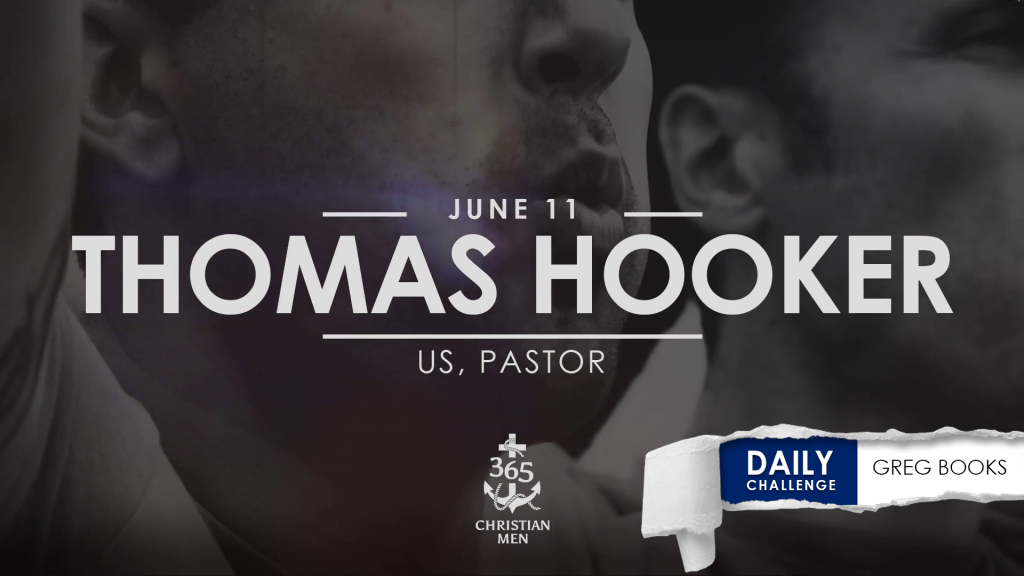June 11. Thomas Hooker. Hooker lived long before the United States had a flag with thirteen stars. He was a pastor willing to pick a fight he believed in. And he believed the people had the God-given right to vote.
So he took his people and founded the Colony of Connecticut. Now there’s a man ready to act on what he believes. Today’s story gives us a more close-up look at Thomas Hooker, the pastor.
It can be tough, but sometimes the right thing to do is to admit we’re wrong.
Hooker shook his head because he didn’t know what to try next. The town troublemaker was at it again. Certainly, like most boys his age, he was young and mischievous, but for this boy, trouble wasn’t the exception. It was his norm. And he had been reprimanded—a lot.
And this time, there was property damage.
Seeing his property destroyed, Hooker’s neighbor was furious, and he demanded that the boy be reminded that such behavior was wrong. Now, Hooker—as the town preacher—was assigned to find out the truth and to dole out the punishment.
While Hooker loved the truth, punishing wayward boys was not his favorite task. But the boy had been caught and hauled in to see Mr. Hooker, and the child now stood waiting to be interrogated.
In his mind, Hooker rehearsed the lecture he was about to give, and he approached the young accused. Some guidance could surely save the boy from destroying property again.
Hooker began. Had the boy destroyed the neighbor’s property?
No.
What had compelled him to do such reckless behavior?
He didn’t do it.
Didn’t he know he brought dishonor to his family and to God by sinning so much?
But the boy crossed his arms and again said he didn’t do it.
Hooker scratched his head. The evidence was all there. The property was destroyed. The boy’s reputation alone proved it was him. If he would just tell the truth, his punishment wouldn’t have to be as severe.
But the boy shook his head and said he didn’t do it.
Hooker asked question after question, but the answers were all the same. The boy said he was innocent this time and that someone else had destroyed the property.
By this time, Hooker became angry. Destruction of property was bad enough, but lying on top of it? He had had enough. His voice rose, and he pointed an accusatory finger. If the boy would just admit the crime, this matter would be done and over with.
But the boy said quietly, “Sir, I see you are in a passion. I’ll say no more to you.” Then he turned and ran away.
Somewhat shocked, Hooker was left alone there. What sort of child would be so rebellious?
But soon Hooker realized he had been too harsh. Aside from knowing the boy’s bad reputation, what proof did he have? No one had witnessed the crime. No one had seen the boy get into trouble with his neighbor.
Hooker remembered the look of frustration on the boy’s face as he had run away, and guilt washed over the pastor. What if the boy were innocent?
Satan was the accuser, and God was the judge. Hooker was the boy’s under-shepherd, and though he couldn’t figure out the true culprit, God would. And all Hooker could do was find the boy and apologize.
Right away, Hooker had someone bring the child back.
But the wronged boy didn’t care to meet the preacher’s sad eyes. He wasn’t in the mood for another lecture.
Hooker told the boy that there was no proof he had done the destruction.
The boy said he had not done it, and this time Hooker believed him. Said he wished he had believed him sooner.
Hooker said that when they had talked before, he had gotten too angry. “It was my sin, and it is my shame,” Hooker said. “I am truly sorry for it, and I hope in God I shall be more watchful hereafter.”
The boy’s indifferent expression suddenly changed, and he looked confused. He wasn’t used to a grown-up apologizing for being wrong. In fact, they had always said he was wrong. The boy’s mouth dropped slightly open, and he seemed not to know what to say.
So Hooker continued to provide some older-brotherly advice to help the boy stay out of trouble.
“He who covers his sins will not prosper, but whoever confesses and forsakes them will have mercy” (Proverbs 28:13 NKJV).
Have you wronged someone? How can you make things right? It can be tough, but sometimes the right thing to do is to admit we’re wrong.
Hooker, Edward W. The Life of Thomas Hooker. Lives of the Chief Fathers of New England. Vol. 6. Boston: 1870.
Mather, Cotton. Magnalia Christi Americana or The Ecclesiastical History of New-England. Vol. 1. Hartford: Silas Andrus, Robert & Burr, Printers, 1820.





